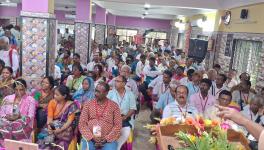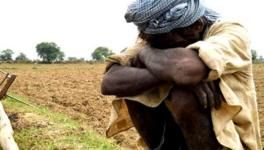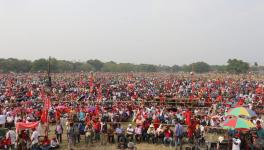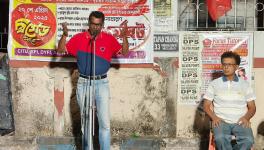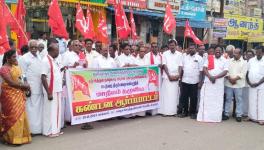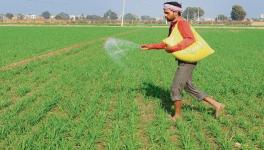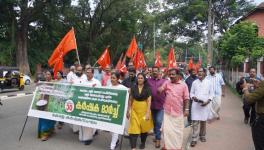Kerala’s Struggling Rubber Farmers Reject Archbishop’s Offer to BJP

Mar Joseph Pamplany. Image Courtesy: Wikipedia
Tellicherry archbishop Mar Joseph Pamplany’s recent offer to help the BJP open an account in Kerala in the next election if the Centre increases the price of rubber to Rs 300/kg has been rejected by farmers.
The import of rubber has increased beyond 5 lakh metric tonnes in recent years due to the Centre’s policy, leading to a massive fall in the price of local rubber. The Rubber Board’s lack of support in the form of subsidies have further burdened farmers.
The production of natural latex rubber has been decreasing with Kerala’s contribution to the national rubber production falling below 75% for the first time during 2021.
Though the price of rubber sheets has fallen to around Rs 140/kg, the prices of value-added products, including tyres, have increased steeply, benefiting companies at the expense of farmers.
Cultivated on 21.8% of the land, rubber is Kerala’s most important cash crop after coconut in the state. Though productivity has slightly increased, the area under cultivation reduced from 5.51 lakh hectares (ha) in 2017-18 to 5.50 lakh ha in 2021-22.
All India Kisan Sabha (AIKS) finance secretary P. Krishnaprasad attributed the struggle of rubber farmers to the 2010 ASEAN-India Free Trade Area.
“The price of rubber sheets has fallen from Rs 245/kg in 2011 to Rs140-Rs150/kg and even hit a low of Rs 77/kg in between. With the state producing around 9 lakh metric tonnes of rubber annually, farmers have incurred an estimated loss of about Rs 7,400-Rs 8,000 crore per year,” he told Newsclick.
Since 2011, rubber imports have rocketed in the last decade with 5,46 lakh tonnes imported in 2021-22. It peaked at 5.82 lakh tonnes in 2018-19.
Imports have severely affected farmers and workers, including rubber tappers and allied sectors, dependent on the industry. Imported rubber is available at a lower price than domestic rubber, favouring manufacturing industries.
“Despite the decrease in rubber price, the cost of tyres has almost doubled in recent years. Corporate entities are enjoying the double benefit of falling prices of rubber and increasing prices of its products,” Prasad said.
The AIKS has been propagating the idea of farmers cooperatives to challenge the corporate-guided industry to ensure minimum price for all agricultural products, including rubber, wheat and paddy.
“The archbishop wants the rubber price at Rs 300/kg. But planters can get Rs 407/kg, including a share of profit from value-added products, through a cooperative system and a farmer-owned industry,” Prasad argued.
The AIKS has accused venture capitalists and industrial corporations of looting farmers through speculative pricing.
Farmers have claimed that the current price of Rs 140-Rs 150/ kg doesn’t even cover the estimated production cost of Rs 180/kg.
Pamplany made the statement after reportedly meeting Kerala BJP Minority Morcha leaders. “The settler farmers end the BJP’s search for an MP from Kerala,” he said during a farmers protest. The BJP has been desperately trying to win over minorities in Kerala through different outreach programmes.
Kerala Assembly Opposition leaader VD Satheesan reminded the archbishop of late Stan Swamy’s incarceration and the increasing attacks on churches in different states, including in Karnataka, by the right-wing groups.
Kerala Karshaka Sangham (the AIKS state unit) vice-president and rubber farmer KJ Joseph rejected Pamplany’s statement as “unwarranted”.
“Farmers are aware of BJP policies and activities of right-wing groups against minorities. People respect him as an archbishop but won’t follow his advice on voting for a particular political party,” he said.
The AIKS has been continuously demanding the Rubber Board’s intervention in addressing the problems of farmers but the BJP government has not fulfilled the demand for restricting the import of natural rubber.
“The BJP has been neglecting rubber farmers since it came to power. Though the price had started falling in 2011 during the UPA rule, the Rubber Board supported farmers. It has now been reduced to a board functioning for namesake,” Joseph said.
“The falling prices have affected farmers, who refrain from tapping latex regularly. The policies should be changed to improve their lives. The archbishop cannot garner support for the BJP through false promises and religious mobilisation,” Joseph added.
Meanwhile, the LDF government has established Kerala Rubber Limited to develop infrastructure to ensure better prices and manufacturing of value-added products.
Get the latest reports & analysis with people's perspective on Protests, movements & deep analytical videos, discussions of the current affairs in your Telegram app. Subscribe to NewsClick's Telegram channel & get Real-Time updates on stories, as they get published on our website.










